Death of Digester Version 1
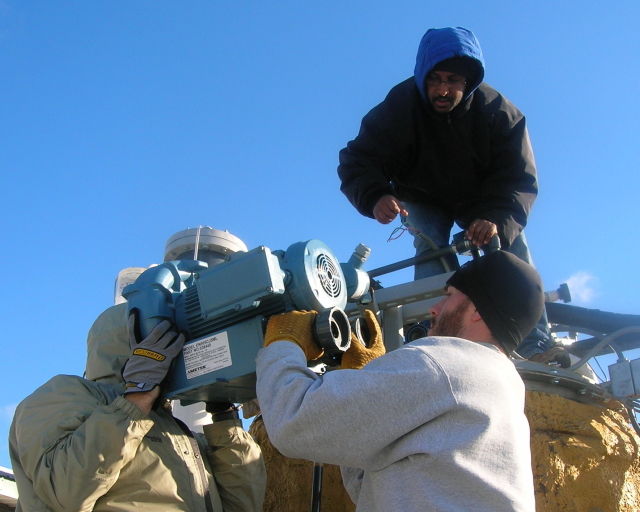 So around mid-December, disaster struck. Some of the pipes on the
digester froze and broke, and it was cold enough that in-field
repairs, and the modifications needed to enable the system to last
through the winter were deemed unreasonable. Thus, we made
the decision to bring it back to Clarkson to thaw it out and
recondition it. Turns out that this was quite a lot more
complex that originally assumed.
So around mid-December, disaster struck. Some of the pipes on the
digester froze and broke, and it was cold enough that in-field
repairs, and the modifications needed to enable the system to last
through the winter were deemed unreasonable. Thus, we made
the decision to bring it back to Clarkson to thaw it out and
recondition it. Turns out that this was quite a lot more
complex that originally assumed.
Originally, we thought we could just drain the tank,
hitch it up, and tow it home. Upon our arrival on site it was
immediately obvious that this was not going to work.
First off, the trailer tires were frozen solid into the ground.
Second off, it appeared to be full of silt. Therefore, we had
to take it apart on site, to get it empty enough to move it.
At right shows Yotam, Dave, and I stripping equipment from
the lid. We wanted to get all the heavy stuff off, so we
could lift the lid and see what we were dealing with on the inside.
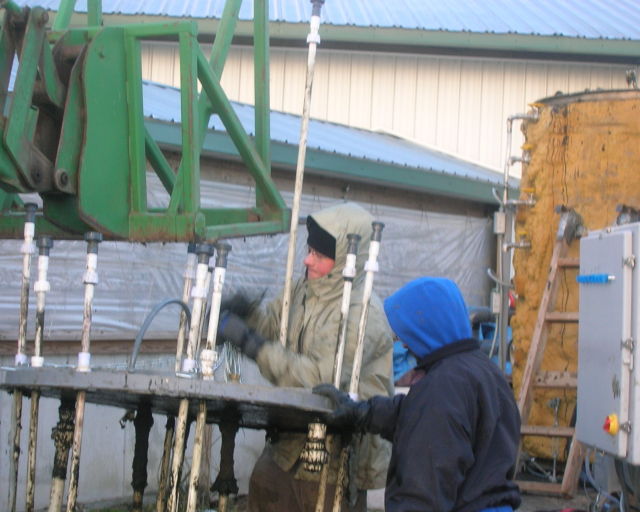 The farm hands, being very helpful through the whole project,
brought over their front end loader with the bail lifting
attachment. We hooked up the chains and lifted off the
lid. Shown here is Yotam and I unhitching the chains and
getting it apart and onto the ground. The lid on this
is more cumbersome than heavy, with all of those pipes
and things going down the center. This is why I
chose to have nothing but the bare minimum of plumbing
going through the lid. It is still a big job to get the
lid off, but you no longer need a crane to do it.
The farm hands, being very helpful through the whole project,
brought over their front end loader with the bail lifting
attachment. We hooked up the chains and lifted off the
lid. Shown here is Yotam and I unhitching the chains and
getting it apart and onto the ground. The lid on this
is more cumbersome than heavy, with all of those pipes
and things going down the center. This is why I
chose to have nothing but the bare minimum of plumbing
going through the lid. It is still a big job to get the
lid off, but you no longer need a crane to do it.
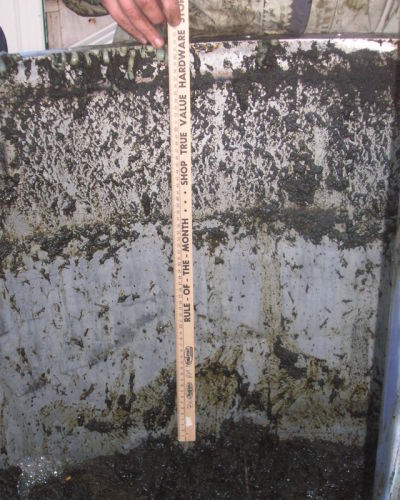 What was inside of the tank when we finally climbed back up to look.
All that black in the tank that you can see is in fact
sand-compacted manure. Rather the consistancy of very thick mud.
We tried draining it first using all available valves and pumps,
but it did not work. This material is almost non-Newtonian.
Go find a bunch off mud, wet it down, and mix in sand at
about a 1:1 ratio, and then fill a four foot diameter tank
with 5 feet of the stuff. This was why we could not roll
the digester, or even get it off the jacks.
It was full of several thousand pounds of wet terrible
muddy sand. Of course, this happened in December,
its 12 degrees, and it's getting dark. We can't leave it there,
or it would freeze solid by morning.
What was inside of the tank when we finally climbed back up to look.
All that black in the tank that you can see is in fact
sand-compacted manure. Rather the consistancy of very thick mud.
We tried draining it first using all available valves and pumps,
but it did not work. This material is almost non-Newtonian.
Go find a bunch off mud, wet it down, and mix in sand at
about a 1:1 ratio, and then fill a four foot diameter tank
with 5 feet of the stuff. This was why we could not roll
the digester, or even get it off the jacks.
It was full of several thousand pounds of wet terrible
muddy sand. Of course, this happened in December,
its 12 degrees, and it's getting dark. We can't leave it there,
or it would freeze solid by morning.
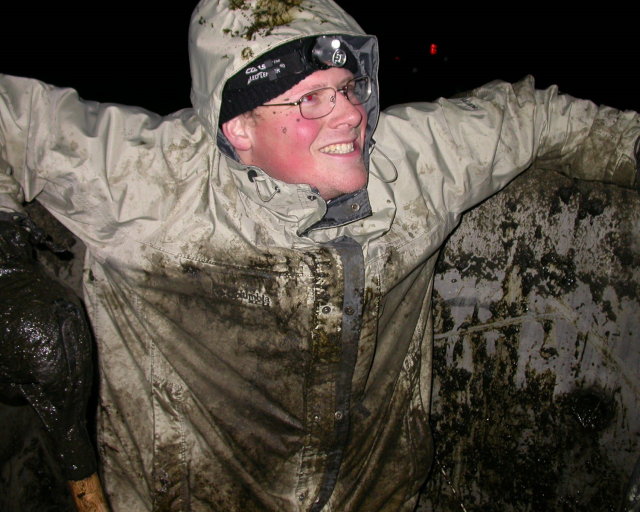 What's that you say? Shoveling? Yep. We ran back to the
hardware store after we saw what we had to do, and got
a shovel. Into the tank I went. For the next three hours
I shoveled sand laden shit out of the tank, heaving each
50 pound load over my head. Let no one ever tell you
that shoveling out tanks is easy: Most shovels are too
long to operate functionally in a confined space, so the handle keeps
banging into the side. I ruined my raincoat,
a pair of shoes, a pair of pants, and a set of gloves.
I am very glad I had water proof boots and gloves, however.
We were debating waiting to do this the next day,
but the tank had been heated as of about 3 hours before
this photo was taken, and the manure was still warm
and steamy. At least it was warm in the tank.
What's that you say? Shoveling? Yep. We ran back to the
hardware store after we saw what we had to do, and got
a shovel. Into the tank I went. For the next three hours
I shoveled sand laden shit out of the tank, heaving each
50 pound load over my head. Let no one ever tell you
that shoveling out tanks is easy: Most shovels are too
long to operate functionally in a confined space, so the handle keeps
banging into the side. I ruined my raincoat,
a pair of shoes, a pair of pants, and a set of gloves.
I am very glad I had water proof boots and gloves, however.
We were debating waiting to do this the next day,
but the tank had been heated as of about 3 hours before
this photo was taken, and the manure was still warm
and steamy. At least it was warm in the tank.
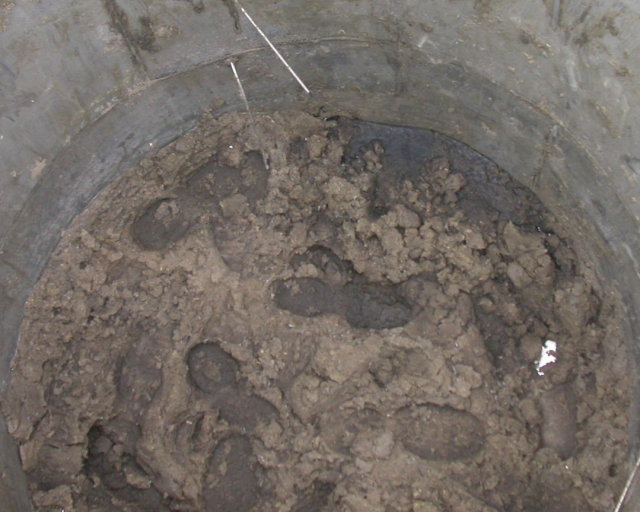 The next day, the bottom of the tank was essentially rock.
It is basically a manure-sand composite, very strong,
and very hard to get out. It doesn't shatter like ice,
so you cannot chip it, and it is really dense, so takes
a lot of heat to melt it. Furthermore, it is sitting
in the bottom of what is at this point an ice-chest,
which made it even harder to thaw out.
The next day, the bottom of the tank was essentially rock.
It is basically a manure-sand composite, very strong,
and very hard to get out. It doesn't shatter like ice,
so you cannot chip it, and it is really dense, so takes
a lot of heat to melt it. Furthermore, it is sitting
in the bottom of what is at this point an ice-chest,
which made it even harder to thaw out.
Just beneath this photo is the 'false bottom', part of
our sand-separation system, and beneath that is more
frozen sand. I could not get all of this out in the
field, since it required more demolition time and
equipment that what we had available. Eventually,
I enlisted the help of some fellow grad students
in April when it warmed up to thaw it out. We
ran steaming hot water over this material for hours,
shoveling it as it thawed. We had nearly a weeks worth of
eight hour days remove this material and the
false bottom from the tank.
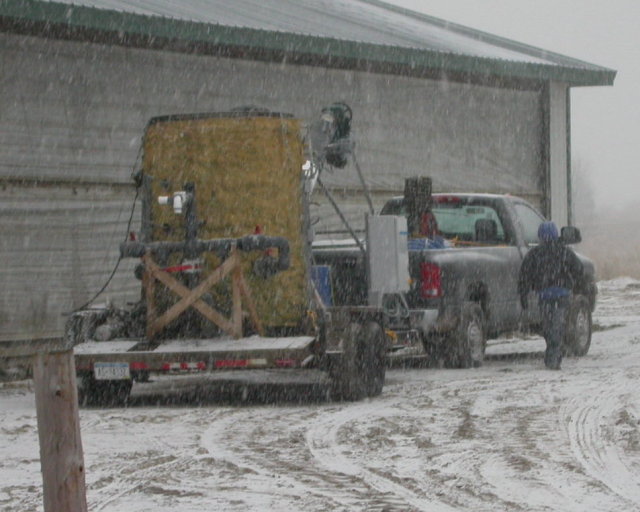 Notice in the first photo at the top of this page, we have blue
skies and loveliness. When shoveling the tank
out, it was a cloudless, starry night. The next day,
we went back to hitch up and start driving home,
and it starts snowing. Dave was driving the trailer,
and I was following behind in a car full of other
pieces and parts. We almost got back to Clarkson without
incident, unless you count the slipping on ice with
a giant crowbar and sledge hammer, the tire
exploding on the roadway, or the struggle
to find a place to park a sad-looking poop digester
for a few days while we track down tire repair people.
Notice in the first photo at the top of this page, we have blue
skies and loveliness. When shoveling the tank
out, it was a cloudless, starry night. The next day,
we went back to hitch up and start driving home,
and it starts snowing. Dave was driving the trailer,
and I was following behind in a car full of other
pieces and parts. We almost got back to Clarkson without
incident, unless you count the slipping on ice with
a giant crowbar and sledge hammer, the tire
exploding on the roadway, or the struggle
to find a place to park a sad-looking poop digester
for a few days while we track down tire repair people.

